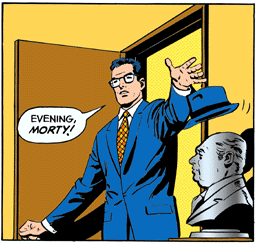
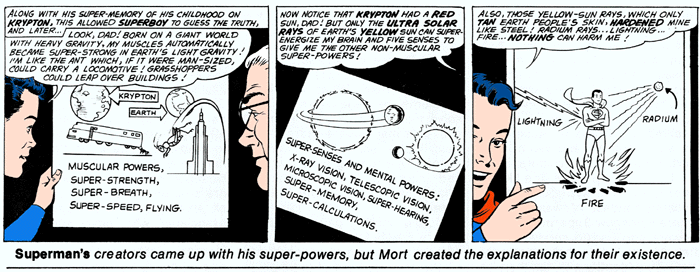
|
|
|
|


Great Neck, Long Island is about an hour from New York City by train. It's not an unpleasant ride; it is always impressive to watch Manhattan's towers -- leapable in a single bound by only one man we know -- rise behind you. The traveller leaving New York passes the site of the 1964 World's Fair, with its immense symbol, the skeletal globe, and a few of the pavillions still standing.
For many years before and five years after that globe was constructed, Mort Weisinger drove from Great Neck towards that incredible city of towers and terrors, his mind filled not with the grandeur of the metropolis before him, but with the problems of plot... how could he get an almost invulnerable character into and out of dangerous situations this month?
But all that is ended now. The visitor calls Weisinger from the pleasant Great Neck station and soon an immense white Cadillac pulls into the parking lot, with a large, beaming man wearing a cossack's fur hat behind the wheel. He greets the visitor expansively as the latter slides onto the red upholstery of the front seat. "I bought this car to bolster my ego," Mort says, "the day I quit work for National."
A quick drive and a turn down a fir-lined road and the visitor is escorted into Mort's handsome brick house where he meets Mort's wife, Thelma. Almost immediately Mort is off onto his favorite comics-related subject... namely, why he isn't working for them anymore. "I couldn't learn from anyone up there," he says, "They learned from me... At my salary you could say it was a golden graveyard, but it was a graveyard nonetheless."
Startling, isn't it? For who other than Mort Weisinger had been known as the backbone of the greatest of all super-heroes, Superman? The visitor closes his jaw and opens his ears. Mort Weisinger, editor for so many years of the Superman family of comics, had many things to say about the comic medium and his own career in it... and he was just getting warmed up.
Mort oversaw the development of a vast Superman mythology, more extensive and more comprehensive than the universe of any other character in popular fiction.
"The Phantom Zone, which would bring life to criminals from Krypton... the bottled city of Kandor, in which we recreated Krypton's former civilization... the whole mythology which made Superman different from all the other bigshot bang-crash heroic characters..." Mort and the writers and artists working for him "created the whole structure."
"I would bring out a new element every six months," he says, "to keep the enraptured kids who were our audience involved." "Why should Superman be able to fly," he asks, repeating a question that no doubt occurred to him on one of his trips to work. "So he came from another planet and there's a difference in gravity? Why should he be able to fly? Why should he have X-Ray Vision? It's contrary to science and to reason. I originated the concept that in a world circling a yellow sun his powers are multiplied, and that a yellow sun gave him these abilities. These are things the originators of Superman didn't figure out; they gave us this fabulous character without explaining why all his fabulous attributes existed."
The list goes on, "I created the Lois Lane and Jimmy Olsen books over a lot of opposition, as spinoffs from Superman. The management protested that the characters weren't strong enough and they'd never go. But I had a gut feeling... and I talked to kids. I'm not taking credit for the success of those books, but I did know my Superman character and mythology, and the proof of success was in the box office."
"I'm not saying," Mort continues, "that I blitzed the world with these developments overnight. It took time. It took living with the character." He surely did that. Weisinger joined the world of comics in the early 1940s, when most fans and readers of today were not even born... in fact, when their fathers and mothers were reading comics. In 1940, when Mort first joined the world of comics after leaving the editorship of Thrilling Wonder Stories, a great science fiction pulp magazine, he was in charge of no fewer than 40 titles. "When I took over Superman," he says of these days when all the world was verdant freshness, "a friend of mine told me that these characters, superheroes, were cycle things that 'can't last for more than three or four years.' So it became a challenge for me... to prevent Superman from being just a fad."
Mort was also editor of Batman, and he attributes some of the luck with Superman to things he liked about the Caped Crusader. "Batman was my favorite," he confesses, "and I got the book up to a circulation equal to Superman's. I tried to analyze why Batman was such a favorite with me and decided that it was because when he was in trouble, Batman can get hurt. Superman is invulnerable.
"To make him more of a likable character, the type of story I became fondest of was the one where somehow Superman lost his powers and had to survive on his natural wits. I'd do that repeatedly. You could identify with him then, an outstanding character deserving of your admiration, a real hero because of the clever things that he did, when deprived of his super-powers.
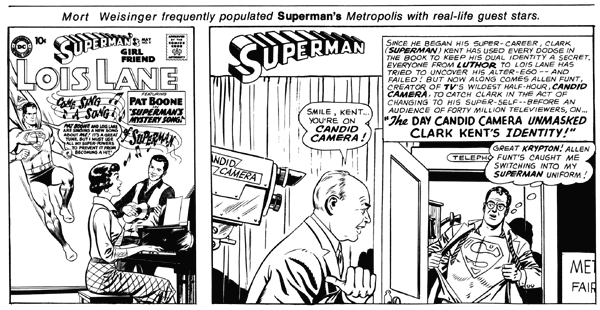
"I enjoyed surprising the readers, giving them something new. Which is why I introduced live personalities... real people... into the pages of Superman. I had a story in which Superman appeared on 'This is Your Life' with Ralph Edwards, one where he got together with 'Candid Camera's' Allen Funt, and one based on the fact that Steve Allen looked a little bit like Clark Kent.
I even had a story where Ann Blyth played a mermaid, before we introduced Lori Lemaris. I'm also proud of having dreamed up the 'imaginary story' gimmick to motivate otherwise impossible stories and having conceived the idea of DC's first giant anthology - The Superman Annual.
"It may seem corny to you, but one of the ways I was able to plot Superman was to pretend that I was Superman. What would my problems be, and how would I react if I were this magnificent character? It was like a schizoid personality. Instead of counting sheep when I had insomnia, I often fantasized what I would do as the Man of Steel."
Mort eventually gave up editor-ship of Batman and many of the other magazines and concentrated on the #1 superhero of them all. In the early 1950s, Mort was called out to California by Whitney Ellsworth, "a man I really could learn things from," to work as story editor for the Superman TV series. "He insisted that I do it. On the way out to the coast, we sat in a roomette on a train with a tape recorder and plotted about fifteen stories for the series. I met George Reeves, the actor who played Superman and he was one helluva nice guy - very, very unaffected. The amazing thing was that when you met Reeves you said, 'My lord, it's Clark Kent!' It was like seeing Clark Kent step out of the comic pages into three dimensions."
Mort's experiences with television enabled him to score another coup, getting Reeves a guest star spot, complete with Superman costume, on the 'I Love Lucy' show.
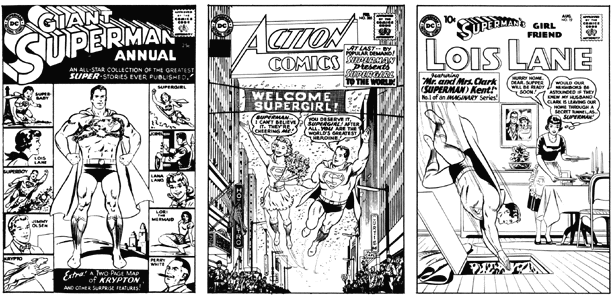
He also helped to develop a number of writers who went on to great fame and fortune in the video business, chief among them a name familiar to those who read the credits of Perry Mason reruns, Jackson Gillis. From Superman, Gillis went on to such assignments as the Hardy Boys serial on the Mickey Mouse Club and eventually to a job on Columbo. Mort points to him, as well as to writers like David Chantler, William Woolfolk, and the great screenwriter Leigh Brackett, as examples of proteges and associates who have surpassed him in terms of success. "Edmond Hamilton wrote comics for me and had originally worked for me in the pulps. So had Alfred Bester. Today these men are a helluva lot more successful than I." But this only gives Mort satisfaction.
Mort's own career as a writer is of great interest to your interviewer and he asks to see the place where Weisinger does his magazine writing: his current, almost full-time occupation. Impatient with himself as poor host, Mort leads the way upstairs to a comfortably sloppy paneled den dominated by bookshelves, framed copies of several of Mort's articles on the walls and an immense desk covered with papers. One of the articles is called "How Ralph Edwards Fools 'Em." Mort accompanied Edwards on several This Is Your Life escapades to get his story of how the clever impressario suckered the celebrities whom he was to honor on his popular 1950's show. Another hits close to home - a Better Homes & Gardens story on the Comics Code Authority and how it changed the field. It is illustrated by selected comic panels before and after the Code got hold of them.
"I was always writing," Mort explains, "even while I was editing comics. I guess that I wrote about 1000 articles in my spare time, moonlighting." He's had articles in The Journal of the AMA, Readers' Digest, Collier's, The Saturday Evening Post. One of his articles was even read into The Congressional Record. American Way, the American Airlines magazine for travellers in flight, recently featured a profile of Weisinger. Nowadays he does much of his writing for the popular Sunday supplement, Parade... including one recent article on "How Magicians Trick You," and one on why certain finalists in the Miss America pageant can never win the crown.
That subject is a ripe one for discussion with Mort Weisinger, since one of his bookcases lining the paneled walls in his study contains eight or ten hardcover copies of Mort's best-selling novel, The Contest. A big, decidedly adult novel published by World (and by New American Library in its paperback editions), it reflects a long-time Weisinger interest in beauty pageants and the people around them.
"I was once a judge in a preliminary Miss America contest," he explains, "and while speaking to the girls, I learned the inside story. I became a judge of a lot of other contests. Back when I was in the army, before I went to Yale," - where he wrote episodes of a radio show called "I Sustain the Wings" and incidentally roomed with Broderick Crawford and William Holden - "I was stationed in Atlantic City and did public relations work for the pageant. I learned the inside picture, all right.
"Researching the book further, I went to Europe with - " and Mort names the world-famous host of the real-life contest, "who was a friend of mine and thought I was going to do a simple article on the pageant. Now he won't talk to me."
The Contest was a big success. Mort was paid $125,000 for the movie rights, and the book saw printings in several foreign languages, a surefire indication of its appeal.
While he was writing the book and keeping up his input to magazines, Mort was still making that daily drive from Great Neck to the National offices in New York, wrestling with the problems of keeping interest alive in Superman. Living with Superman had become such a part of his life that he literally could not escape it.
"One night, when Dorothy Woolfolk," a former DC editor, "was up at the house visiting, I awoke at four o'clock in the morning thinking that I was dying. I had an ulcer and it had become inflamed. The tension was just too much." He went to the hospital... where he eventually found himself disussing covers with artist Curt Swan.
Mort met the problem head-on and went to see a therapist. As he talked about the job and his perspective of it, the nature of the problem became clear to him. "When people asked me what I did for a living, I would supress the fact that I was editing Superman. I'd tell people that I wrote for Colleier's or The Saturday Evening Post, True magazine... where I had published articles. Why did I do this? Because, subconsciously, if I said I was involved with Superman, I was a big man - but shining in Superman's reflected glory. I was his satellite.
"Secretly, I was jealous of Superman... just as Clark Kent is.
"The doctor told me 'Listen, it's a great product, I read it when I was a kid and my kids read it now; it's nothing to be ashamed of.' But I still wanted to get out. I wanted to get into a world where I was my own boss, where I was truly responsible for my own work. In comics, you always have to rely on your writer or your artist - who in turn has to rely on the inker or the colorist, which brings up something I'll get to in a minute. I wasn't dealing with something of my own."
Weisinger wanted out of his editorial job. But he couldn't simply quit; apparently the involvement with Superman was too deep for that. He came up with the scheme of asking for bigger and bigger raises, but none proved impossible; the then-management at NPP kept meeting his demands, granting him generous stock options. He was even made a vice president of public relations for the company. If NPP was a graveyard for Mort, it was indeed a golden one. Finally, he made the break. And he hasn't regretted it.
"I live an active life," he says with some satisfaction, "one my wife Thelma can share with me. On assignments we travel to Spain, Hawaii and London. I'm making a great deal more than I ever could as an editor, often more with one article than an editor can pull down in half a year."
Writing for comics seems to Mort to be "an eternal graveyard. Writers rarely get out of comics. I think Cary Bates is an example of a writer with ambition who has been able to do something - sell a plot for a James Bond movie. But I've found that nobody really respects a comics writer. Mentioning it is a liability. Mickey Spillane wrote comics when he was hungry, but he quickly got out of it. Many of the other writers who wrote for me were ones I got from outside the field of comics, from science fiction, and they used to do comics work for what they called 'hungry money.' They'd turn out a quickie once a week to pay the rent. Then they went on to radio, TV work, novels or films. They outgrew the field.
"People always accused me of being an egomaniac as an editor because I always gave the writers my own plots. I did that for a reason. If I asked a writer to bring in his own plots, and he spent a weekend working on four of them, and I didn't like any of the four, then he's wasted a whole weekend of work.
"In the article business, if I have several outlines out with magazines and Family Circle, say, doesn't like one, I can send it to the Ladie's Home Journal. If they don't like it, I can send it to Good Housekeeping. And so on. It isn't wasted work. Frequently, a writer would come in with a plot that may have been good, but we'd have it in inventory already or else the Comics Code wouldn't pass it. Now what's he supposed to do with it? I couldn't pay him for an outline we'd never use. The least I could do was to think of a plot for the writer and if he liked it - I'd never force it down his throat - we'd kick it around and evolve a story." Often stories grew around a pre-drawn cover - an innovation for comics Mort brought from the pulps - which insured every issue of a strong cover scene. "A writer knew that he would never go away empty-handed."
Mort has some opinions about comic artists of today, too. "To me the definition of an artist, in the traditional sense, is a guy who conceives of the idea, makes the sketch, does the pencilling, inking, coloring; it is a one-man job. The message I want to get through is for artists to have respect for themselves and their craft, to try to get into control - where you don't have an inker blaming a penciller for a bad job, or vice versa, or both of them blaming the colorist. There should be a movement for the integrity of the artist and his best expression. An artist should have some control, even to the coloring, while a great colorist can make a story sing. At the same time, some comics artists have to be trained to draw for dramatic coloring.
"You either are are you aren't a complete artist. The present sytem, to me, seems to be a masquerade of comics. It's like football. When I was a kid and a guy got called out after a play, he stayed out for the remainder of the quarter. Now they have a two-or-more platoons system that is a perversion of football. In the old days you had your team and you were stuck with it: these were the guys who had to be offensive, defensive, be able to kick. Now you have two teams, each of which is only half a team. You have three teams in comics, the penciller, the inker, the colorist, and to me that's a perversion of the artist. One man should do all and never have to rely on others or accept something that doesn't represent him at his best."
A good example, we meekly inquire? "Hal Foster. He did the entire package."
We turn again to the Weisinger bookshelves and note Mort's best known book, 1001 Valuable Things You Can Get For Free, a compendium of freebies available to anyone. Since the first edition in 1955 the book has gone through at least 41 paperback printings and sold over three million copies. Mort shows him where Abbie Hoffman praised the book in his radical bible, Steal This Book, and an edition of Who's Who, with Mort mentioned in it. The entry gives Mort's age as 59 (it has since gone on to 60).
Against another wall is a five-foot shelf of autographed editions from "my peers. My colleagues. We are all members of the society of Magazine Writers, of which I am Vice-President. There's been a lot of talk about Weisinger being a one-man show," Mort says, but he indicates the shelf, filled with works by such popular writers as William Woolfolk, Al Toffler, Vance Packard, Betty Friedan, Ray Bradbury and Kreskin, "but I have the respect of writers whom I respect."
Mort ducks into a huge closet-sized cabinet and shows the visitor some of the rarest Weisinger papers. Most, he admits, have been donated to Syracuse University at their request, but he still has some gems around. Among them is a copy of The Planet Volume 1 Number 1, a newsletter published by a Bronx-based group of science fiction fans back in the Pleistocene... 1930. Mort's earliest career, as a science fiction fan publisher and agent, closely parallels that of his lifelong friend and DC co-worker Julius Schwartz.
Mort remembers the days of the Scienceers with glee, especially recalling the twilight "commando raids" into Van Cortlandt Park to steal a bench for their meetings.
He shows a 1938 board game, a la Monopoly, which he created, called Movie Millions. Stacks of supplements and magazines containing Weisinger work - "most is in Syracuse; this is what I kept for myself" - is brought forth as Mort seeks issue #1 of The Time Traveller, his first in-print collaboration with Schwartz. The search proves fruitless so we turn to the desk, a riot of notes, articles, xeroxes of checks and photos.
Mort's files, as indicated, are a wreck. "I always say that when I retire from writing I'll organize these files. If I cleaned my desk, I'd have nothing to look forward to. John Kiernan was a great critic of English literature,a great scholar. He once told me that he'd never read King Lear, Shakespeare's greatest play! 'I'm saving it for my old age,' he said. I'm saving this project - cleaning my desk - for mine!"
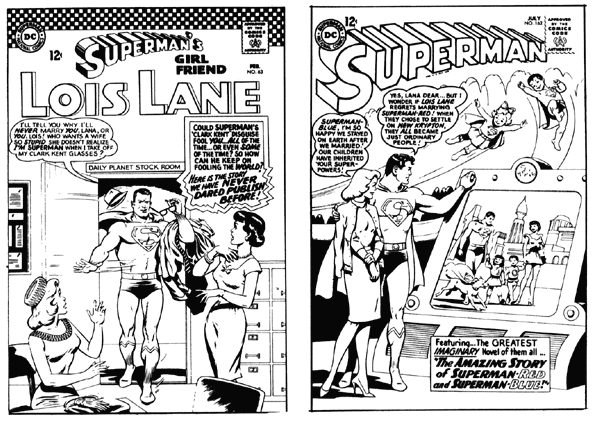
One of Mort's most enjoyable activities is appearing on the college lecture circuit. He's hit many American colleges in the last couple of years: the Universities of Hartford, Alabama, Kansas, Minnesota, Conecticut, plus Hofstra University, Knox College, Syracuse University and many more. Questions naturally revolve around his experience with the Man of Steel.
"Most frequently, I get asked how can I have any respect for a character who believes that Lois Lane is so stupid that she doesn't realize he's the same man if he takes off his glasses!"
Having wondered this ourselves over a comic-reading life of 20-plus years, we ask Mort what he tells the students.
"I've got an answer," he says with satisfaction. "I say look, when you were a kid and your parents told you the story of Cinderella, and how at the stroke of 12, her fine coach and clothes turned to a pumpkin and rags, her footmen to mice, and so on, how come you never questioned why one thing didn't change - that glass slipper? Why not? Nobody has ever asked why it didn't turn back to a rotten old shoe. I call that the Cinderella Fallacy and that's the same sort of license we exercised in Superman. People buy it!"
There is more talk. Mort describes the time he stumped the experts on a very popular radio quiz show called Information Please. Mort visited the show with Julius Schwartz and noted that while a question submitted from the listening audience was being introduced and the name of the listener was being read, the panel of experts paid no attention, seemed to be asleep. "I sent them a question that said this: 'Gentlemen, this question has to be read exactly as I've typed it. The next question, ladies and gentlemen, cannot be repeated. It is in two parts. It comes from Mr. Mort Weisinger of North Bergen, New Jersey, ('where I lived at the time') The first part of the question is WHAT IS THE NAME OF THE AUTHOR OF THIS QUESTION? The second part is, WHERE DOES HE LIVE?' They went into shock. They couldn't answer.
"Years later I was at a party with the show's host, Clifton Fadiman, who told me about other questions the experts couldn't handle. It gave me the idea for an article that I later sold!"
The hour grows late. We must depart and, thanking Thelma for her hospitality, we gather our camera, tape recorder, and the photos that Mort has lent us for this article. Mort drives us back to the Great Neck station, explaining the origin of his fur cap: he was given it as a gift on a visit to Russia. He also recalls being aboard a Russian airliner on November 22, 1963, and the look of sadness and shame on the stewardess's face when she told him that President Kennedy had been murdered.
As we chug back to Manhattan, we review our notes. Outside, the pleasant Long Island countryside is pitch dark. Mort has described his career in many ways and we did not always agree with our subject's sometimes overly harsh ideas and opinions on the comics industry and its promise. But he reflects on his own fantasies about "being Superman"... and remembers what Mort had told him...
"The Number One thing I remember fantasizing that I'd do, if I were Superman was this. I would warn the whole world, 'Stay away from all places where there was any ammunition!' Then I would turn on my heat vision from space and all the ammunition in the world would be blown up. Then there couldn't be any more wars.
"People used to ask me why Superman didn't simply do that, stop all wars, win our fights. I'd tell them - just as seriously as they were asking me - that Superman thinks we should fight and win our own battles."
Here Comes Superman!
an article by Mort Weisinger
